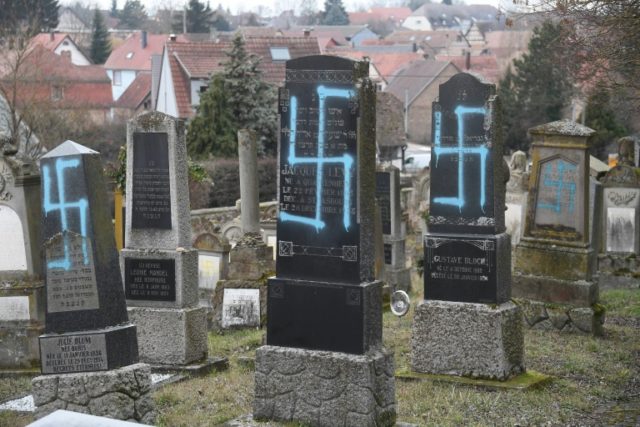Antisemitic conspiracy theories in which Jews are blamed for the spread of the coronavirus pandemic and the resultant economic crisis have “skyrocketed” over the past year, a new report revealed.
The annual report from Tel Aviv University’s Kantor Center for the Study of Contemporary European Jewry said while Jews were more protected from physical assaults as a result of lockdowns and isolation, “new phenomena developed on the internet, such as zoom bombing and the darknet, which are difficult to quantify.”
The report also noted that while violent antisemitic events decreased from 456 (2019) to 371 (2020), a “20 percent increase was observed in desecrations of synagogues, graveyards and Holocaust memorials (which were closed or unguarded due to the lockdown and therefore easy prey for antisemitic vandalism).”
Moshe Kantor, president of the European Jewish Congress, said: “Anti-Jewish hatred online never stays online. We have to be prepared that anti-Semitic conspiracy theories could lead to physical attacks on Jews when lockdowns end.”
Many of the theories involved Jews and Israelis manufacturing and then spreading the virus as part of a plan to later save the world with expensive vaccines.
The report said:
The advent of the vaccines, coupled with Israel’s vast vaccination campaign, assisted by Israelis and Jews who hold prominent positions in the companies that produce these vaccines (such as Tal Zaks, Chief Medical Officer at Moderna, and Pfizer CEO Albert Bourla), was used to reinforce these accusations: Israelis and Jews join hands so that Israel may be the first to recover from the pandemic, while the rest of the world stands in line and begs the Jews for help.
While efforts by social media giants like Twitter and Facebook to crack down on antisemitic and racist postings have led to a 50 percent drop since 2018, conspiracy theorists have moved as a result, leading “to a strengthening of undercurrents — namely, the darknet.” the report said.
“The coronavirus pandemic and the resulting reality dictated both the nature and extent of antisemitism in 2020, which was an unusually tense and turbulent year all over the world,” Prof. Dina Porat, the head of the Kantor Center, said in a statement.
“Prejudice, superstition, primordial emotions, and bizarre theories surfaced on the scene, and manifestations of antisemitism, both verbal and visual, were vicious and outrageous. Blaming the Jews and Israelis for developing and spreading the coronavirus (or ‘Judeovirus’), was the main motif in this year’s antisemitic manifestations. This notion is rooted in a deep fear of the Jew/Israeli as a spreader of disease in both the past and present.”
The report is released every year to coincide with Israel’s Holocaust Remembrance Day.
Israel on Thursday morning came to a standstill as sirens blared throughout the country in memory of the six million Jews murdered by the Nazis during the Holocaust.

COMMENTS
Please let us know if you're having issues with commenting.